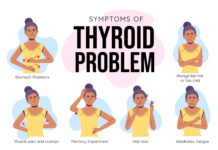By Dr. Girish SP, Lead Consultant – General & GI Surgery, Aster RV Hospital
Abdominal bloating is a sensation of tightness, pressure or fullness in your abdomen. It may or may not be accompanied by a visually noticeable swelling or a distended abdomen. The sensation might range from barely irritating to excruciatingly agonizing. It normally fades away in time, but for some people, it frequently recurs. Hormonal changes and digestive problems can also cause cycles of bloating. You should visit a gastroenterology facility to discover the reason for your persistent swollen abdomen.
About 10% to 25% of normally healthy individuals report having periodic abdominal bloating. Up to 75% of people report that their symptoms range from moderate to severe, and 10% of people claim to have it on a regular basis. It could be as high as 90% among people with Irritable Bowel Syndrome (IBS). Bloating can occur both before and throughout the menstrual cycle for up to 75% of women. Only 50% of those who report experiencing bloating also describe having an enlarged abdomen.
Symptoms of abdominal bloating
Gas, discomfort and stomach pain are typical signs of bloating. Additionally, you could also experience regular burping, belching or belly rumbling or gurgling. Severe bloating may be accompanied by other troubling symptoms, like:
- Blood in stool
- Noticeable loss of weight without exercising or other activities
- Vaginal bleeding (between periods or in post-menopausal women)
- Nausea
- Vomiting
- Diarrhea
- A worsening case of heartburn
- Fever that is caused by an infection.
Important Announcement – EasyShiksha has now started Online Internship Program “Ab India Sikhega Ghar Se”
Causes of bloating include:
- Constipation is a typical contributor to bloating. Because one of the symptoms of constipation is having fewer bowel movements than usual, you may be suffering from constipation without realizing it. Even if you have regular bowel movements, you could still remain constipated. Other constipation signs and symptoms include:
- Struggling to begin or complete a bowel movement
- Stool that resembles pebbles and rocks
- Feeling full even after a bowel movement.
- Abdominal pain and bloating may be worsened by constipation. The longer your stool remains in your colon, the longer it takes the bacteria to ferment it, which causes increased gas and bloating.
- Other causes of bloating besides constipation include:
- Sensitivity in the gut: People who suffer from IBS may be particularly sensitive to gas, which can result in discomfort, cramps and diarrhea
- Small intestinal bacterial overgrowth (SIBO): Normally healthy individuals have comparatively little bacteria in their small intestines. People who have IBS with diarrhea, intestinal surgery or both are more likely to have SIBO, which can result in bloating
- Gastroparesis: This disorder results in delayed emptying of the stomach, which can lead to bloating, nausea and even bowel obstruction
- Gynecological conditions: Bloating can occasionally be brought on by gynecological diseases, such as issues with your ovaries or uterus. Ensure that you always get a pelvic check-up from a gynecologist every year.
ALSO READ: 3A Composites flagship Brand ALUCOBOND Launches a Series of Colours and Surfaces
How stomach bloating be prevented:
- You can lessen stomach bloating caused by food or alcohol consumption by altering your way of life. Good broad principles to prevent bloating include the following:
- Drink adequate water: This will promote motility throughout your entire digestive tract and prevent your food from being too compacted and hard to move through as it is being broken down.
- Exercising: Exercise keeps your bowels working and helps reduce water retention. Additionally, it can aid in preventing the quick weight gain that often targets your belly.
- Do not eat anything processed: As they are low in fiber and rich in salt and fat, processed foods are unhealthy.
- Become mindful of what you eat: Take your time, chew each bite completely, and finish your meal before you feel completely full.
This year educate yourself and develop your career with EasyShiksha





































































